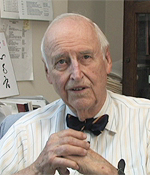 |
コロンビア大学における
アジア学の展開と角田柳作(2) |          |
|
|
 |
| ウィリアム・T・ド・バリー コロンビア大学名誉教授(録画) |
 |
|
Mr. William Theodore de Bary (East Asian Studies expert at Columbia University, with the title John Mitchell Mason Professor Emeritus)
- Dr. Sachie Noguchi (Japanese Studies Librarian, C.V. Starr East Asian Library, Columbia University): Professor de Bary, what originally made you interested in East Asian Studies?
 Mr. William Theodore de Bary, Professor, Columbia University: My interest in Asian Studies came very early in my college years. I had a teacher in a course on western civilization who was himself a specialist in American history, but the first meeting of that class he said, "You realize although the class is called Contemporary Civilization, it really only deals with western civilization. I hope some of you young people in the class will think about bringing Asia into the subject of contemporary civilization." And with that suggest, I started Chinese language study and a whole program of Chinese studies but at that time nothing specifically Japanese and when I was recruited later into the Naval Japanese Language School it was basically on the basis of my study of Chinese, not Japanese. But I did study Japanese in the Navy Language School and there for the first time, I met Donald Keene. We had not known each other in college; he was a year behind me. I guess he may have known about me, but I did not know him at that point. Mr. William Theodore de Bary, Professor, Columbia University: My interest in Asian Studies came very early in my college years. I had a teacher in a course on western civilization who was himself a specialist in American history, but the first meeting of that class he said, "You realize although the class is called Contemporary Civilization, it really only deals with western civilization. I hope some of you young people in the class will think about bringing Asia into the subject of contemporary civilization." And with that suggest, I started Chinese language study and a whole program of Chinese studies but at that time nothing specifically Japanese and when I was recruited later into the Naval Japanese Language School it was basically on the basis of my study of Chinese, not Japanese. But I did study Japanese in the Navy Language School and there for the first time, I met Donald Keene. We had not known each other in college; he was a year behind me. I guess he may have known about me, but I did not know him at that point. - But we were together during much of the war in the Pacific and when we returned, he wished to return to Columbia, I had started graduate study at Harvard, but he spoke so warmly about Tsunoda as his teacher, and I could that there was nothing like that at Harvard, so I came back to finish my graduate study at Columbia, mainly attracted by Tsunoda, from what I had heard Keene say about him. Now you may wonder then how that connects with my original intentions to bring Asia into the, what we call the core curriculum. The fact is that Tusnoda's teaching, and his background was more ideally suited to the purposes I had in mind than anybody else that was teaching available at that time, even my Chinese instructors, teachers knew very little about the Chinese tradition as a source of texts or classics that might be part of one's education in the sense of what is central or core, and in the original course that I referred to, the western civilization course, the way they went at this was to include the reading of major classic works from earliest times down to the present. So you got a sense of how the civilization developed but you were reading it in sources books, original writings. Not just theorizing about civilization, but seeing what Homer and Heraditus and Thucydides, Plato, Aristotle, St. Augustine and so forth. What they had to say about the perennial concerns of human life; that was the focus. That was the core. That is why we call it a "core curriculum."
|